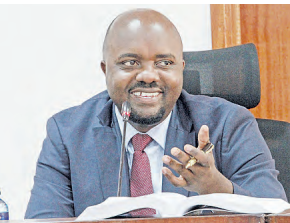
 Public Accounts Committee chairman Tindi Mwale on April 1 /ENOS TECHE
Public Accounts Committee chairman Tindi Mwale on April 1 /ENOS TECHEMembers of Parliament now want the Attorney General to consider scrapping or reviewing the law capping salary deductions from going beyond 70 per cent of civil servants salaries due to increased statutory deductions.
The move follows a rise in the number of government employees taking home 30 per cent or lower every month which goes against the employment act.
However, instead of reducing the deductions, a parliamentary committee is now calling for removal or a review of Act that criminilises deductions beyond two third of an employees pay to align with the increased deductions.
The National Assembly’s Public Accounts Committee (PAC) attributes the steep reduction in take-home pay to increased deductions introduced under President William Ruto’s administration, including the Housing Levy, Social Health Authority contributions, and the revised National Social Security Fund (NSSF) rates.
Committee chairperson and Butere MP, Tindi Mwale expressed concern over the growing number of government departments flouting the regulation, which is intended to protect workers from being left without adequate income after deductions.
“The law is no longer practical due to multiple tax deductions that have eroded workers’ earnings,” Mwale stated, referring to Section 19 of the Employment Act, 2007, which prohibits employers from deducting more than two-thirds of an employee’s basic salary.
Should the law be scrapped, the move will give the state a free hand to deduct as much as possible.
The parliamentary watchdog committee is now set to summon the National Treasury to explain why thousands of civil servants are taking home less than a third of their net salaries, with many having committed more than the legally allowed two-thirds of their basic pay to loan deductions and statutory obligations.
Civil servants have in recent months seen their pay slips shrink, with 1.5 per cent of gross pay deducted for the Affordable Housing Levy, 2.75 per cent for the Social Health Insurance Fund (SHIF), and increased contributions under the NSSF Act. In response, the committee has directed the National Treasury to consult with Attorney General Dorcas Oduor on the viability of scrapping or reviewing the onethird salary rule, given the current tax regime.
The matter was raised during a session with Correctional Services Principal Secretary Salome Beacco, who was appearing before the committee to respond to audit queries.Lugari MP Nabii Nabwera warned that unless the issue is addressed, it will continue to feature in audit reports.
“This committee has asked the National Treasury— given the coming into effect of the NSSF Act, SHIF, and the housing levy—to engage the Attorney General for a way forward. If not addressed, this matter will remain an audit concern,” Nabwera said.
“We need a definitive ruling on this issue. Given the current deductions, the one-third rule is clearly untenable,” he added.
Funyula MP Wilberforce Oundo echoed the sentiment, insisting that civil servants should not be punished for a situation beyond their control.











